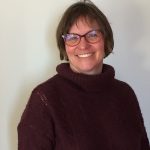The Indigenous Initiatives Support Fund
The creation of the Indigenous Initiatives Support Fund translates the Foundation's sincere desire to…
The Foundation of Greater Montréal’s and the Institut du Québec’s teams wish to thank the volunteer members of the 2022 Vital Signs working group. They shared with us, in an open and generous manner, their detailed knowledge of the trends and needs on the ground. In doing so, they made our report more accurate, more human and more representative of the lived experiences of women and girls in Greater Montréal. Learn more about them and about their work below.
 Alison Abrego
Alison AbregoAlison Abrego is animated by her experience of having grown up in the Saint-Michel neighbourhood, her passion for inclusiveness, activist art, her mission in systems change, her work with young people in community action, and the privilege of having a degree in social work. Among her core responsibilities are ensuring that the voices and needs of young people are taken into consideration, and creating alternative safe spaces. We saw that nearly all the young people who were involved in our youth discussions expressed the desire to have safe spaces in which to express themselves on issues that are of concern to them, such as sexual violence against youth in school, the sexualization of the body, systemic racism, the
environment, and issues impacting Indigenous communities.
About the Girls Action Foundation
Created in 1995, Girls Action Foundation is a not-for-profit organization that firmly believes in the power of girls, young women and gender-diverse youth to act as agents of social change. With the help of our cross-Canada network of organizations, the Foundation leads, conceives and implements transformative programs that are relevant and adapted to communities’ changing realities. Girls Action Foundation inspires and supports empowerment, leadership and healthy development in girls, young women and gender-diverse youth, by enhancing their access to resources and opportunities.
 Sonia Alimi
Sonia AlimiSonia Alimi is a PhD student in sociology and a lecturer in sociology in the Institut de recherches et d’études féministes at Université du Québec à Montréal. She has worked at DAWN Canada (DisAbled Women’s Network of Canada/ Réseau d’Action des Femmes Handicapées Canada) for six years as a research coordinator. Her thesis focuses on anti-racist and decolonizing feminist practices of French women of North African origin.
About DAWN-RAFH Canada
DAWN-RAFH Canada’s mission is to end the poverty, isolation, discrimination and violence experienced by women with disabilities and Deaf women. DAWN-RAFH Canada is the only national body in Canada specifically dedicated to defending the rights of Deaf girls and women and those living with disabilities, as well as ensuring their advancement and full inclusion in society. DAWN-RAFH Canada’s overall strategic orientation involves implementing innovative action, establishing partnerships and creating networks that will lead all levels of government, organizations working for the cause of individuals living with disabilities or women, and other stakeholders to prioritize DAWN-RAFH Canada’s key issues and work to resolve them.
 Monica Dunn
Monica DunnMonica Dunn has been TCVCM’s coordinator since 2018. She has been working in the community sector for more than 20 years, and has been involved in cross-sectoral collaboration for nearly 10 years. She is also a mediator and facilitator. Her background is in sociology, and she is trained in conflict resolution and in non-violent communication.
About the Table de concertation en violence conjugale de Montréal
The TCVCM has as its mission to bring together and mobilize the various actors in the field, working in partnership and collaboration. Its overall approach involves analysis, prevention and action, and aims to protect women, children, other victims, or individuals who are especially vulnerable or who have special needs, and make perpetrators accountable for their actions, with a view to combatting domestic violence and its consequences. It currently has more than 50 members from 11 sectors of activity, from both institutional and community contexts.
 Justine Gendron
Justine GendronA criminology student and holder of a certificate in feminist studies, Justine joined the Table de concertation en violence conjugale et agressions à caractère sexuel de Laval in 2021 as General Coordinator. Her primary function is to ensure coordination among the different actors fighting domestic and sexual violence in Laval, while promoting the values and principles of the TCVCASL. In both her studies and her activism, she focuses in particular on the traumas suffered by victims of intimate partner violence.
About the Table de concertation en violence conjugale et agressions à caractère sexuel de Laval
The TCVCASL is a regional cluster of multidisciplinary community and institutional actors that combat domestic and sexual violence. It promotes collaboration, training and knowledge sharing among its members, and raises general public awareness of these forms of violence, working from a perspective of social change.
 Catherine Lavarenne
Catherine LavarenneCatherine Lavarenne is in charge of funding strategies for the Conseil québécois LGBT, and of support for members in their own quest for funding. Her role is to make funding opportunities known to LGBTQ+ organizations in Quebec, and help them draft grant applications. She is active in advocacy vis-à-vis governments and granting institutions, seeking to focus their attention on the needs of sexually diverse and gender-diverse communities.
About the Conseil québécois LGBT
The Conseil québécois LGBT is the provincial government’s preferred interlocutor in all matters regarding the protection of the rights of sexually diverse and gender-diverse persons in Quebec. Its approach is based on collaboration among its members, that is, 63 community groups and organizations that are active on the ground. Apart from being a defender of rights, the CQLGBT supports networking, mutual aid and solidarity in the LGBTQ+ community sphere in Quebec.
The Foundation of Greater Montréal and the Institut du Québec also wish to thank Michèle Chappaz from the Mouvement pour mettre fin à l’itinérance à Montréal (Movement to End Homelessness in Montreal, Isabelle Gélinas from the YWCA and Asmaa Ibnouzahir from the Institut F for the interviews they gave us in order to add their expertise and viewpoints about certain groups which are not as well represented in the statistical data.
Since 2020, FGM has been especially active in working to improve conditions for women and girls in our community. This new edition of Vital Signs is, in that spirit, intended as an overview of the situation of women and girls in Greater Montreal.
The creation of the Indigenous Initiatives Support Fund translates the Foundation's sincere desire to…
The world around us is changing, but our determination remains the same. In 2025 and beyond, we will…
FGM's ambition is to create an impact fund that will enable Montreal’s philanthropic stakeholders to…
Notre site connaît actuellement des problèmes techniques. Nous nous excusons de la gêne occasionnée.
This will close in 20 seconds